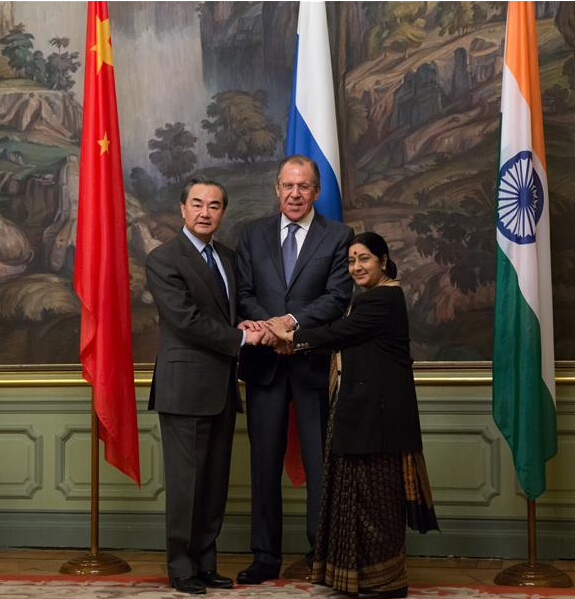On April 30, the Russian-based Kontinental Hockey League (KHL) is expected to formally accept the application of a new ice hockey team, HC Red Star Kunlun, for the 2016-17 season. This is notable because HC Red Star is going to be based out of Beijing, thus ushering in a new era for the KHL, which is in its ninth season, and bringing a new angle to Russian-Chinese relations.
The KHL was founded in 2008 with 21 of its 24 teams based in Russia (one each played out of Belarus, Kazakhstan, and Latvia). However, from the start it had goals to move not just beyond the borders of Russia, but outside the former Soviet Union. For years, rumors abounded that teams from locations as diverse as Austria, Germany, Italy, Poland, and Switzerland would join, though none of that happened. Expansion did occur, and in 2012-2013 eight different countries were represented in the KHL, though all were from former Communist states.
It was not until the 2014-15 season that this changed, with the addition of Jokerit, an historic team based in Helsinki, Finland. Critics would note that this was only made possible by the purchase of the team by a group led by Boris Rotenberg, a close friend of Vladimir Putin. Indeed nearly all KHL teams are owned either by oligarchs or state-run corporations, or a mixture of both, though details on ownership have never been fully disclosed.
With no proper moves into Europe, the KHL’s first president, Alexander Medvedev (who also served as the director-general of Gazprom Export from 2006 to 2014), was removed from his position and replaced by Dmitry Chernyshenko, who had previously served as the director of the 2014 Sochi Winter Olympics. Unlike his predecessor, Chernyshenko was not interested in moving into Europe. A combination of sanctions and general opposition from the European domestic ice hockey federations both contributed to this decision, so instead he looked east, toward Asia.
The choice to do so is rather logical. There are already two KHL teams located in the Russian Far East (in Khabarovsk and Vladivostok), and a team from the Russian-controlled Sakhalin Island joined Asia League Ice Hockey, which mainly consists of teams from Japan and South Korea, in 2014. There is also no denying that the chance to market themselves to a potential audience of 1.3 billion people is alluring to KHL officials, especially as the Chinese are not as hostile to Russia when compared to Europe.
However it is the increased focus of China on winter sports that seems to have truly spawned this decision. It is no coincidence that an ice hockey team was announced for Beijing only months after that city was awarded the 2022 Winter Olympics. With seven years until the start of the games, there is time to develop a taste for ice hockey in China. It would also serve as a means to improve the Chinese national team, which
currently ranks 38th in the world and is playing in the fifth tier of the International Ice Hockey Federation’s (IIHF) World Championships.
A parallel can be seen in nearby South Korea; after being awarded the 2018 Winter Olympics, their national team was the target of a mass effort to improve their performance. In ten years they have moved up from 33rd overall to a high of 21st. While still not good enough for the 16-team elite division, South Korea’s team is close enough that they were granted an automatic place in the Olympics. If China does not see similar improvements, the IIHF is under no obligation to grant them a similar exemption, which could be highly embarrassing for the host nation.
Reports surrounding the new team imply that it will try and be bold for its premier season. Even before it has been officially confirmed, which is merely a technicality in the world of the KHL, HC Red Star has reportedly made offers to Ilya Kovalchuk, one of the most prominent Russian players in the world, and Mike Keenan, one of the most highly successful coaches. Kovalchuk is famous in North America for walking away in 2013 from the National Hockey League (NHL) and a 15-year, $100 million contract in order to play in Russia, while Keenan is the only coach to have won a championship in both the NHL and KHL. These rumours have been denied since they were first reported in late March, but it is no secret that Kovalchuk has had issues recently with his current team, SKA St. Petersburg, and Keenan has not coached since being relieved in October 2015.
It will be one of the KHL’s boldest moves to have a team based in Beijing when the season starts in August. The risk of such a move is immense for both the KHL and the Chinese. But if it is a success, it could see the start of much closer cooperation between the Russians and Chinese in terms of sports, and a drastic shift in Russia’s attempts to cultivate influence, from west to east.
http://russia-insider.com/en/russias-hockey-league-worlds-2nd-richest-coming-china/ri13897






 Keep quiet is the best option knowing that Russia is not please with how India cozy with US. I think Russia's statement over SCS has sent a strong message to India that it will not remain neutral between China and India if the latter keeps tilting toward US at the expense of Russia.
Keep quiet is the best option knowing that Russia is not please with how India cozy with US. I think Russia's statement over SCS has sent a strong message to India that it will not remain neutral between China and India if the latter keeps tilting toward US at the expense of Russia.
